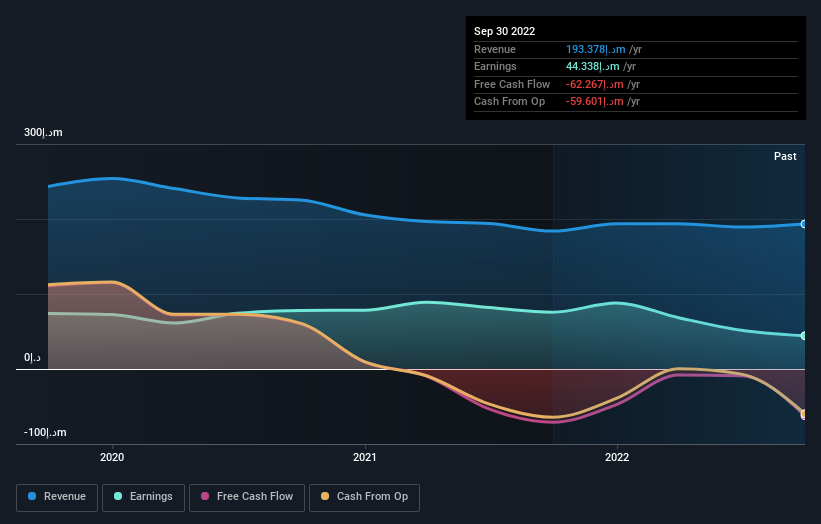- United Arab Emirates
- /
- Insurance
- /
- ADX:TKFL
public companies who own 42% along with institutions invested in Abu Dhabi National Takaful Company PSC (ADX:TKFL) saw increase in their holdings value last week

Key Insights
- Significant control over Abu Dhabi National Takaful Company PSC by public companies implies that this group likely has considerable sway over management and governance-related decisions
- The top 2 shareholders own 69% of the company
- own 27% of Abu Dhabi National Takaful Company PSC
If you want to know who really controls Abu Dhabi National Takaful Company PSC (ADX:TKFL), then you'll have to look at the makeup of its share registry. The group holding the most number of shares in the company, around 42% to be precise, is public companies. Put another way, the group faces the maximum upside potential (or downside risk).
Public companies gained the most after market cap touched د.إ676m last week, while institutions who own 27% also benefitted.
Let's take a closer look to see what the different types of shareholders can tell us about Abu Dhabi National Takaful Company PSC.
See our latest analysis for Abu Dhabi National Takaful Company PSC

What Does The Institutional Ownership Tell Us About Abu Dhabi National Takaful Company PSC?
Many institutions measure their performance against an index that approximates the local market. So they usually pay more attention to companies that are included in major indices.
Abu Dhabi National Takaful Company PSC already has institutions on the share registry. Indeed, they own a respectable stake in the company. This suggests some credibility amongst professional investors. But we can't rely on that fact alone since institutions make bad investments sometimes, just like everyone does. It is not uncommon to see a big share price drop if two large institutional investors try to sell out of a stock at the same time. So it is worth checking the past earnings trajectory of Abu Dhabi National Takaful Company PSC, (below). Of course, keep in mind that there are other factors to consider, too.

We note that hedge funds don't have a meaningful investment in Abu Dhabi National Takaful Company PSC. The company's largest shareholder is Abu Dhabi Islamic Bank PJSC, with ownership of 42%. For context, the second largest shareholder holds about 27% of the shares outstanding, followed by an ownership of 12% by the third-largest shareholder.
A more detailed study of the shareholder registry showed us that 2 of the top shareholders have a considerable amount of ownership in the company, via their 69% stake.
Researching institutional ownership is a good way to gauge and filter a stock's expected performance. The same can be achieved by studying analyst sentiments. We're not picking up on any analyst coverage of the stock at the moment, so the company is unlikely to be widely held.
Insider Ownership Of Abu Dhabi National Takaful Company PSC
The definition of company insiders can be subjective and does vary between jurisdictions. Our data reflects individual insiders, capturing board members at the very least. The company management answer to the board and the latter should represent the interests of shareholders. Notably, sometimes top-level managers are on the board themselves.
I generally consider insider ownership to be a good thing. However, on some occasions it makes it more difficult for other shareholders to hold the board accountable for decisions.
Our data cannot confirm that board members are holding shares personally. Not all jurisdictions have the same rules around disclosing insider ownership, and it is possible we have missed something, here. So you can click here learn more about the CEO.
General Public Ownership
The general public-- including retail investors -- own 15% stake in the company, and hence can't easily be ignored. While this group can't necessarily call the shots, it can certainly have a real influence on how the company is run.
Private Company Ownership
We can see that Private Companies own 17%, of the shares on issue. It might be worth looking deeper into this. If related parties, such as insiders, have an interest in one of these private companies, that should be disclosed in the annual report. Private companies may also have a strategic interest in the company.
Public Company Ownership
It appears to us that public companies own 42% of Abu Dhabi National Takaful Company PSC. This may be a strategic interest and the two companies may have related business interests. It could be that they have de-merged. This holding is probably worth investigating further.
Next Steps:
It's always worth thinking about the different groups who own shares in a company. But to understand Abu Dhabi National Takaful Company PSC better, we need to consider many other factors. For example, we've discovered 4 warning signs for Abu Dhabi National Takaful Company PSC (2 are a bit concerning!) that you should be aware of before investing here.
Of course this may not be the best stock to buy. So take a peek at this free free list of interesting companies.
NB: Figures in this article are calculated using data from the last twelve months, which refer to the 12-month period ending on the last date of the month the financial statement is dated. This may not be consistent with full year annual report figures.
New: Manage All Your Stock Portfolios in One Place
We've created the ultimate portfolio companion for stock investors, and it's free.
• Connect an unlimited number of Portfolios and see your total in one currency
• Be alerted to new Warning Signs or Risks via email or mobile
• Track the Fair Value of your stocks
Have feedback on this article? Concerned about the content? Get in touch with us directly. Alternatively, email editorial-team (at) simplywallst.com.
This article by Simply Wall St is general in nature. We provide commentary based on historical data and analyst forecasts only using an unbiased methodology and our articles are not intended to be financial advice. It does not constitute a recommendation to buy or sell any stock, and does not take account of your objectives, or your financial situation. We aim to bring you long-term focused analysis driven by fundamental data. Note that our analysis may not factor in the latest price-sensitive company announcements or qualitative material. Simply Wall St has no position in any stocks mentioned.
About ADX:TKFL
Abu Dhabi National Takaful Company PSC
Provides takaful insurance solutions in the United Arab Emirates and internationally.
Average dividend payer slight.
Market Insights
Community Narratives



